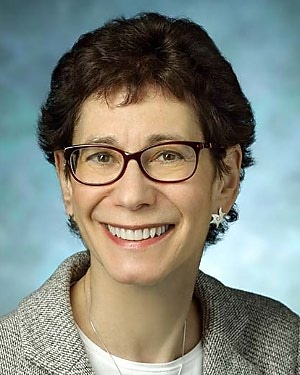Johns Hopkins UniversityEst. 1876
America’s First Research University

Cynthia Wolberger, a professor in the Institute for Basic Biomedical Sciences, works to answer big questions about some of the smallest parts of our cells.
Our bodies, she says, are like a car. You have to understand how a car works in order to fix it, and the molecular machines in our cells — such as the proteins that organize our DNA — are the engines she studies. But these “nanomachines” are so tiny that, should one of them be enlarged to the size of an actual car engine, the car itself would be 100 times the distance of the Earth to the moon.
X-ray crystallography, a technique for investigating molecular structures through the growth of crystals in the molecules being studied, has allowed scientists an approximate visualization of some of these molecular machines for a century. Now, recent technological developments — particularly the Nobel Prize-winning cryo-electron microscopy (cryo-EM) technique — have made it possible to visualize larger and more complex macromolecular machines and are revolutionizing our understanding of biomolecules.
Wolberger says these advances were unimaginable at the start of her career but now allow researchers to look closely at molecular machines and explore the “hows, whys, and whens” of our genes and the proteins that package them. Those answers have led Wolberger and her lab to better understand the molecular basis of diseases, and they have begun to identify drugs that can target enzyme complexes implicated in cancer.
We talked with Wolberger about her career and her new appointment as the Brown Advisory Professor — the newest professorship to be funded by the partners of the Brown Advisory investment firm to support the future of basic sciences.
In college, I looked to combine my interests in physics and biology, and I ended up getting a PhD in biophysics — biology has to follow the laws of physics, after all. But I was not planning to work in structural biology. I didn’t know much about it, to be honest, when I signed up to do a lab rotation in graduate school with a young professor in the field. I just found that I loved doing it.
Unbeknownst to me, there were no jobs in that area of research at the time. Cloning really transformed the field. The ability to clone genes and genetically engineer bacteria allowed you to make the amount of proteins needed for x-ray crystallography. It was electrifying. Suddenly, everybody wanted to hire x-ray crystallographers. It shows you can’t predict what’ll happen in these fields.
The financial support that comes with an endowed chair allows us to try new projects that we wouldn’t normally have funding for and to expand a project before we’re able to get our next grant. This kind of flexible funding is really important for things like that, because, when you have a grant, you’re supposed to only do the stuff you said you would. You’re allowed to branch out a bit, but having the additional funding that comes with a professorship can really make a difference. And it allows you to take risks — if something doesn’t work, you have the freedom to try it again another way.
Others are way more active than I am. But I do tweet some. One of the bigger positives is that you find out about newly published papers and pre-prints (manuscripts that people are planning to submit to journals). You can also find out about funding opportunities.
It becomes a mixed bag when it comes to discussions on science policy, lab experiences, and challenges faced by women in science fields. You can hear a little too much from negative voices. I try to promote people’s accomplishments in our department on the departmental Twitter feed that I run.
It’s a really convenient platform to exchange information, and there can be very interesting conversations. I think it’s especially helpful for young people in their careers to be out there — if they behave themselves.
I love mentoring the next generations of scientists — whether they go into academia or industry, policy, consulting, however they use their training. And I’m very proud of all the students and postdocs I’ve had over the years and the things they’ve done. I always tell them I’m their mentor for life. They can always call or email me for help and advice. One just wrote to me recently saying he was promoted to associate professor with tenure. It just made my day.
Topics: Alumni, Faculty and Staff, Friends of Johns Hopkins Medicine, Johns Hopkins Medicine, Fuel Discovery